With the San Jose Sharks and Colorado Avalanche tied in the series, the teams head to San Jose for Wednesday’s Game 7 decider.
Colorado has proven tough and effective against the Sharks. Netminder Philipp Grubauer has been superb, giving the Avs a chance to win in almost every game. Through four games of the series, the Sharks had been unable to stop Nathan McKinnon, especially when lined up with Mikko Rantanen and Gabriel Landeskog. In the two most recent games, the Sharks have been more effective at stopping the trio. It showed up in the Game 5 result, but not in Game 6.
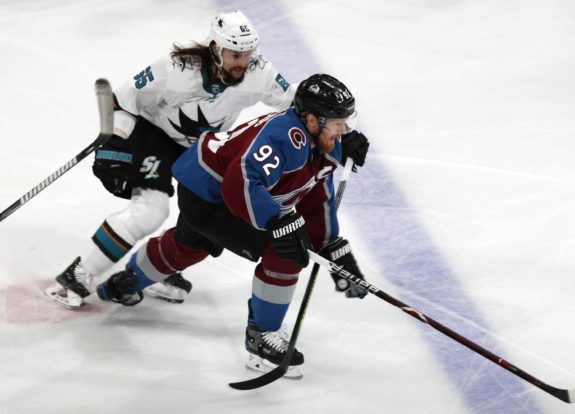
Old Age and Treachery; Youth and Inexperience
For the Avs, defenseman Cale Makar, who has yet to play an NHL regular season game, is paired with Samuel Girard. The two youngsters, both age 20, weren’t even born when Sharks center Joe Thornton finished his NHL rookie season. Yet the Sharks have been unable to exploit the energetic, talented duo.
In microcosm, this is where the series sits – a case of the Sharks, old age and treachery, trying to overcome the Avs youth and inexperience. In Game 6, all three Sharks scores came from players well over age 30. The more energetic Avs got all four scores from players 26 or younger.
The series has been as even as the results suggest. The Sharks won the series opener, 5-2, with a strong game. The Avs won Game 4 with a strong game of their own, 3-0. But the remaining games have been close and momentum has been fleeting, with the teams alternating victories. San Jose won Game 1, 3, and 5, while the Avs won Games 2, 4, and 6.
In Game 5, the older team won. Late in the game, Joe Thornton went after Grubauer. The two pushed and shoved a bit. In the skirmish, Avs defenseman Nikita Zadorov decided to engage the Sharks Marcus Sorensen and got a bit too zealous. The officials called Zadorov for roughing. The Sharks, nursing a one-goal lead with twelve minutes left in regulation, got a power play. While they didn’t score, Thornton’s treachery led to events which cost the Avs two minutes of comeback opportunity.
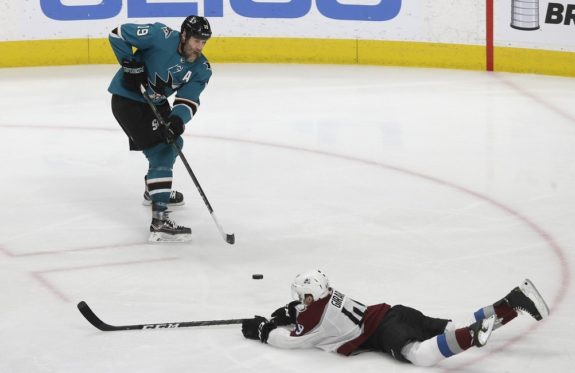
In the battle of young and old, the Avs young legs have been a problem for the Sharks for most of the series. In Game 6, it was decisive.
In overtime of Game 6, it was Makar’s play which led to the winning Avalanche goal. He kept in a clearing attempt by the Sharks and fed the puck to Gabriel Landeskog who’d beaten Erik Karlsson out of the corner to get alone in front of the net. Landeskog crossed over in front of Sharks goalie Martin Jones, forcing the netminder to move laterally. The movement opened up Jones and while Landeskog’s shot was not strong, it found a hole and that was enough to beat Jones for the game-winner.
The Avalanche Strengths
Colorado’s energy manifests itself in a pair of meaningful ways; they’ve been effective on the forecheck and stingy with the Sharks power play. The Sharks are capable of withstanding a strong forecheck, but the Avs have created enough chaos off it to make a difference. Two of their four goals in Game 6, including Landeskog’s game-winner, were enabled by their forecheck.

Meanwhile, the Sharks power play has been very quiet this series, scoring only one meaningful goal while also surrendering one meaningful goal. In Game 6, the Avs took only one penalty and it allowed San Jose a meager 34 seconds of power play time. Between a strong penalty kill and only taking a modest number of penalties, the Avs have effectively eliminated one of the Sharks most potent weapons.
Sharks Vulnerability
While the Sharks dress 18 skaters, they leave a few on the bench for most of the game, which leaves them vulnerable to a fast pace. Prior to Game 6, Sharks head coach Peter DeBoer adamantly denied the Sharks had any energy issues, but it doesn’t take many to change a series. In Game 6, it was Erik Karlsson’s turn to get caught. In addition to the Landeskog game-winner, he’d been beaten twice earlier in the game. He failed to get back defensively allowing a 2-on-1 rush for one score and got caught flat-footed on another allowing a pass to a wide-open attacker at the front of the net.
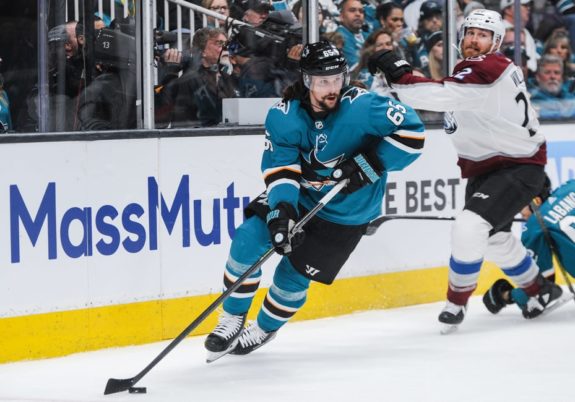
In the latter case, Avs forward Derick Brassard carried the puck from the top of the face-off circle to the bottom before zipping a pass to the net front. Karlsson, in an attempt to defend, went from the top of the face-off dot to the bottom of it, swinging his stick in Brassard’s direction in what amounted to a matador defense. Meanwhile, J. T. Compher skated from center ice to the front of the net, cruising past a leisurely skating Thornton. By the time Brassard delivered his pass, Compher was a good 10 feet clear of Sharks defenders, alone to face Jones in front of the net. Compher scored.
The Avs faced a team full of Sharks, but not all were operating with a full tank of energy. It just took one player running low and they exploited him three times.
There is one statistic which bears noting along this line. The Sharks have allowed 16 goals in the series, only four have come in the first 30 minutes of the games. The other dozen have come after games pass the midpoint. In other words, the Sharks are stingy early in games, but exploitable late after players have used a lot of energy. Whether DeBoer admits it publicly or not, the numbers tell the story.
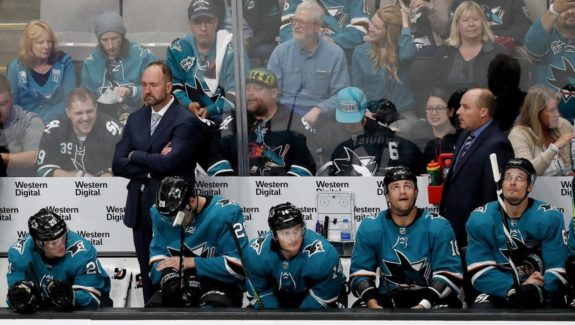
Avalanche-Sharks, Game 7
Few things in sports match a Game 7. Almost nothing will match the Sharks most recent Game 7, just two weeks ago. The overtime thriller against the Vegas Golden Knights is already a classic. The Sharks have been through it all. Still, the Avs now have experience in winning an elimination game and while their youth may make mistakes at times, their energy has been hard for the Sharks to contain.
In part, Game 7 comes down to whether the Sharks have enough energy to finish the series. The series has played every other day, leaving neither team much time to recover. In addition, there is travel, time zone change and altitude change. The younger Avs are better equipped to handle this. The Avs won the energy battle in Game 6 after having lost it in Game 5 and winning it in Game 4.
In part, it comes down to netminding. Both Grubauer and Jones have been good, at times excellent. A goalie could steal a game, especially if the other somehow delivers a merely adequate outing. It isn’t particularly insightful to say the series can come down to the goalie who makes the big save at the key moment, but it sure feels like this is just such a series.
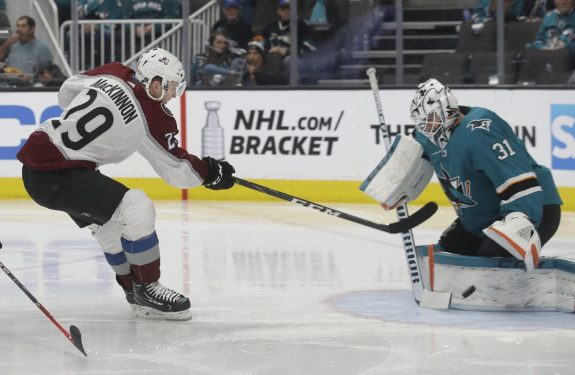
Avalanche Future, Sharks Present
The Avalanche are a team on the rise. They are a good team on the way to becoming a very good team. Their young roster portends a bright future. The Avs long-term arrow is pointed up. The question for this team is, how much of a ‘now’ team are they?
The veteran Sharks team has the best roster in team history, but they are a bit depleted and have been vulnerable in spots. The Sharks have been among the league’s best teams for 15 years. One gets the feeling this is a unique moment where this team either ascends to the top or begins a downward slide. The future is clear as mud. This is a ‘now’ team which feels like a ‘now or never’ team. Game 7 plays a big role in their arrow’s direction.
The Avs offer up a few questions but lots of opportunity. Win, and their improbable quest continues. Lose, and it is a building block for the future. The Sharks have a lot more questions. They don’t need building blocks, they need a championship. They’ve dealt with pressure before; they have the experience edge headed into a treacherous Game 7. But that edge hasn’t proven decisive compared to the Avs youth and energy.
For both teams, Game 7 holds lots of answers.